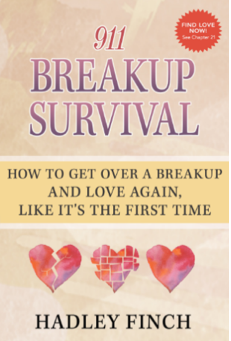Did you marry a difficult mate? If you’re single, do you keep dating people who break your heart?
Find out how your love magnet was set in childhood to attract a match who’ll hurt you, in highlights of my radio conversation for A Lasting Love with Ross Rosenberg.
Ross is a veteran psychotherapist and author of The Human Magnet Syndrome – Why We Love People Who Hurt Us.

Hadley: A woman going through her 4th divorce told me that she wanted help picking a new husband, since she keeps choosing men who lie or cheat or rack up gambling debts, and they hide this till after they’re married. She’s one of many people who are irresistibly drawn, by what seems like an invisible magnetic force, to someone who’ll hurt them. Tell us your theory of why this happens.
Ross: We all are born with a self orientation to either care more for someone else’s needs or your own needs. We will attract our opposite match, like a magnet.
For example, a person who’s geared to care for others and fulfill their needs will be attracted unconsciously to someone who’s more narcissistic — loving and caring for their own needs more than their partner’s needs. So the giver always is attracted to the taker.
It’s like a dance. The person who leads does best with a partner who follows. In my (self orientation) theory I explain the full range of romantic possibilities of attraction, whether you’re emotionally healthy or dysfunctional, like a narcissist, emotional manipulator or codependent.
Hadley: What if someone is on their best behavior while you’re dating, and then they behave in dysfunctional ways after you’re married?
Ross: When a person marries someone who changes, it is not just because of their partner’s issues. It’s a strong indicator you’re having your own issues. A loving, kind, patient, forgiving person will be attracted automatically to a narcissist.
If your partner all of a sudden becomes hurtful or harmful to you, then you must see a therapist to solve the codependent part of you that will keep choosing a hurtful partner.
Hadley: How does self awareness help you break that cycle?
Ross: Self awareness is an important first step. Yet it isn’t enough to help you change the pattern from your childhood, which you’ll keep repeating as an adult. You act out what you’ve experienced in childhood in your adult relationships.
Hadley: Harville Hendrix coined the term, Imago, meaning a romantic partner who’ll throw salt on your childhood wounds, so you can heal them as an adult.
Let’s explain how unconscious feelings of familiarity can cause adults to attract a partner who repeats the dysfunctional patterns of your childhood caregivers, like needing to be loved by someone who can’t love you or anyone else.
Ross: Harville Hendrix is an esteemed colleague, who says we repeat relationship patterns born out of our childhood experience. In my book, I explain how someone becomes a codependent, narcissist or emotional manipulator. It always goes back to your childhood.
If you were a child of an emotional manipulator or narcissist, your emotional needs were not met. You would have been traumatized as a child, because you weren’t loved unconditionally. So you become a codependent as an adult, who learned a coping style that taught you how to please, how to sacrifice, how to get love by making a narcissistic parent feel good about themselves.
If you couldn’t figure out how to meet your parent’s needs, you learned through your own efforts that your needs are met. Then you become narcissistic, focused on fulfilling your own needs.
Until you heal your childhood trauma, you act out to repeat those patterns as an adult. You need therapy to change your childhood pattern.
Hadley: Are you saying hat you can’t change childhood patterns by reading books like yours or Harville Hendrix’s to become aware of old patterns and heal or break them?
Ross: I wish you could use our books to heal dysfunctional emotional patterns. In reality, when you experience psychological trauma as a child or adult, it’s deeply embedded in your psyche and you need help to heal it. You can’t change deeply embedded psychological patterns just through awareness.
However, awareness is an essential part of the healing process. You can’t change a deep psychological pattern unless you’re aware of them and you’re motivated to solve them with some sort of therapy.
Hadley: How do couples with dysfunctional personality traits improve interactions with your intimate partner? How do singles identify warning signs of dysfunctional traits in someone you’re dating?
Get the answers in the next summary of my radio conversation for A Lasting Love with Ross Rosenberg.
Get all the happy, sexy love you desire,
Hadley Finch





 Happy Sexy Love How to bulletproof relationships with happy, sexy love
Happy Sexy Love How to bulletproof relationships with happy, sexy love